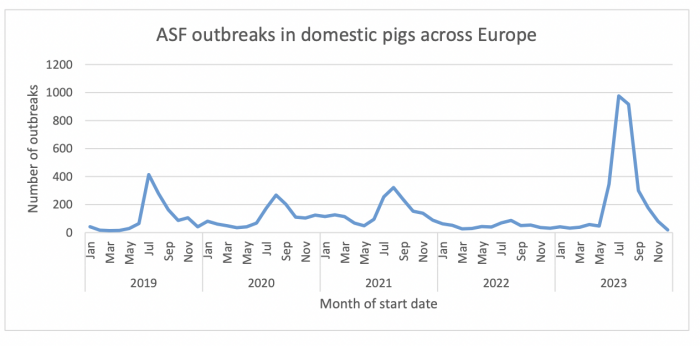APHA highlights concerns over ASF risk posed by illegal meat imports
14th Feb 2024 / By Alistair Driver
The Animal and Plant Health Agency (APHA) has reiterated its concerns over the risk of African swine fever (ASF) reaching the UK as a result of illegal imports.
The agency described the potential for the risk posed by non-commercial imports of pork products from ASF affected areas as of 'high concern', in its latest update on ASF in Europe.
2023 saw a resurgence in the spread of the virus in Europe, after the number of outbreaks in domestic pigs and in wild boar decreased considerably in 2022.
There was a ‘marked increase’ in domestic pig outbreaks across Europe last year, with 1,000 recorded over the summer, the highest figure in recent years, driven by rapid spread in the Balkans.
ASF was reported in domestic pigs in 13 European countries between May 2023 and January 2024, with 2,920 reports of the virus over the period, led by Bosnia and Herzegovina, with more than 1,500 cases. It was one of four Balkans countries affected last year – Serbia reported 482 domestic cases, Croatia reported 293 and North Macedonia, 15.
Elsewhere, Romania reported 468 cases in domestic pigs, Russia, 48, Ukraine, 37 and Poland, 30, while Bulgaria, Greece, Italy, Latvia and Moldova each reported fewer than 20 cases.
APHA said the expansion of ASF into new areas in northern Italy 'remains a concern', with outbreaks on pig farms in Lombardy and Sardinia and growing numbers of cases in wild boar recorded across Calabria, Emilia-Romagna, Liguria, Lombardy in the autumn. "We will monitor the situation closely,” the agency said.

Wild boar infection
The virus was reported in wild boar in 17 European countries over the period, most recently, in January, hitting another Balkans country, Montenegro, for the first time, in Nikšic, 500 metres from the border with Bosnia and Herzegovina.
APHA said the recent spread into Montenegros was ‘not surprising’, given the ASF presence in surrounding countries. It pointed out that Montenegro is not subject to European Commission ASF restrictions and the UK has implemented risk mitigating import.
In September, ASF discovered for the first time in Sweden, almost certainly as a result of human spread. It reported a total of 60 cases in wild boar between September and November.
The agency said this ‘large geographical jump was unexpected and demonstrates again the ability of the virus to be introduced to new territories distant to infected areas’. The measures taken so far in Sweden, such as fencing, depopulation, movement restrictions and surveillance, appear to have contained the disease to a localised area.
The most affected country was Poland with 1,565 reported cases in wild boar, followed by Italy, 736, Latvia, 614, Hungary, 208 and Romania, 133.
High concern
APHA noted that while the number of outbreaks in the Balkans countries is ‘unprecedented’, trade between these countries and the UK is minimal.
It, therefore, considers that the risk of entry of ASF virus in live animals and products of animal origin (POAO) from affected countries, remains at ‘MEDIUM’ (occurs regularly).
However, it added: “The potential high risk for non-commercial imports of pork products from ASF affected areas remains of high concern.”
The agency highlighted evidence from inspections at Great Britain ports, notably Dover, which suggest that there are several vehicles illegally bringing pork meat into Great Britain from regions of the EU affected by ASF.
“Some of these instances involved large quantities of porcine POAO, some of which appear to be home-slaughtered and arrive in Great Britain from an undisclosed origin, as a non-commercial import, with poor levels of biosecurity and food hygiene,” the agency said.
“Therefore, the risk of ASF entering Great Britain, from the human-mediated pathway and moving porcine POAO, is considered to remain at HIGH (occurs very often), though there is considerable uncertainty around this until data is fully collated and analysed, and we will reassess as further information becomes available.
“It remains a critical time for the spread of the virus throughout Europe as well as into other regions through human-mediated routes such as introduction from non-commercial imports (including illegal imports) or fomites.”
Biosecurity advice
The agency highlighted controls introduced in September 2022, restricting the movement of pork and pork products into Great Britain from the EU and European Free Trade Association states. It is no longer legal to personally bring in pork or pork products weighing over 2kg unless they are produced to the EU’s commercial standards.
Although this legislation does not currently apply to non-commercial imports of pork products less than 2 kg from the EU, APHA ‘strongly advises’ all travellers to avoid bringing, buying, ordering on the internet, or requesting any pork products – for example, fresh or frozen meat, dried or cured meats, sausages, salamis, or pâté – back to the UK from affected parts of Europe.
It remains illegal for travellers to import meat or dairy products from Asia and other non-EU country areas.
The agency also reiterated its advice to pig keepers:
- Swill feeding any animal, whether pigs, poultry, ruminants, or wildlife is illegal and has the potential to cause substantial harm.
- All pig keepers, pig producers, smallholders, and the general public are urged to ensure pigs are not fed catering waste, kitchen scraps or pork products, thereby observing the swill feeding ban.
- All pig keepers, whether commercial holdings or not, should remain vigilant and ensure that any visitors or seasonal workers have not had any recent contact with pigs, pig products, pig premises, wild boar (including hunting) or equipment associated with such activities in the affected regions in Europe or other affected parts of the world.
- As with all biosecurity, these measures are only as effective as the people using them, so proper training should be provided.